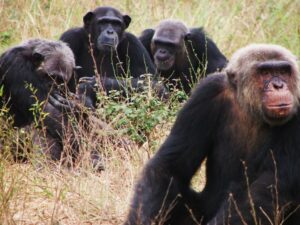Wild Chimpanzees Takes There Old Age As Systematic Study

Wild Chimpanzees Takes There Old Age As Systematic Study of how old age influences the technological behaviours of wild animals.
Wild chimpanzees use tools during some of the most cognitively and physically demanding foraging behaviours observed in non-human animals.
While the behavioural changes that occur with aging have been widely studied in humans and some captive primates
This includes how the capacity to address technical, real-world tasks changes as wild chimpanzees become progressively older.
Tool use is uncommon among animals, possibly because it requires a suite of physical and cognitive abilities, such as planning, fine motor coordination
understanding causal relationships, and identifying physical properties of objects in the environment.
Given many of these faculties can be impacted by aging, wild animals’ tool-use behaviours could be vulnerable to decline with old age
there has been no systematic study of how old age influences the technological behaviours of wild animals, likely due to a lack of long-term data.
Wild chimpanzees at the site are known for using stones as hammers and anvils to crack open oil palm nuts – a population tradition that requires selecting appropriate tools
The chimpanzees were systematically studied using an ‘outdoor laboratory’ in a clearing in the forest
where nuts and stone tools were made available for use by wild chimpanzees over many decades
Elderly chimpanzees showed a significant decline in their attendance at the outdoor laboratory over successive field seasons, unlike younger adults
this decline in attendance was accompanied by a marked reduction in time spent interacting with nuts and stone tools when at the outdoor laboratory
Interestingly, the authors noted stark differences in the magnitude of changes across individuals, with some chimpanzees showing pronounced reductions in efficiency
These results point towards significant individual differences in how old age influences wild chimpanzee behaviours
formerly a keen and efficient tool-user, was taking a very long time to crack each nut, and was changing the stone tools she was using frequently
It is incredible to have the long-term data confirming those observations, and to permit investigation of how tool use is performed during old age for other chimpanzees
“Just as with human technical skills, chimpanzee tool use is culturally learned through social learning and individual practice
By studying the same individual chimpanzees over nearly two decades, we’ve been able to see how chimpanzees’ cultural skills change with old age
As ours was an observational study, we can’t yet identify the specific reasons why aging affects nut cracking
but our results raise important questions about how aging influences apes’ cognition and Behaviour in natural settings.
Future work should explore whether skill proficiency in early life and adulthood, as well as influence the maintenance of such behaviours over an individual’s lifetime.”
archive offers a baseline to inform conservation strategies across wild chimpanzee populations, including accounting for behavioural changes over lifetimes.
Compiled by
World Travel News, Gorilla Trekking Uganda and Gorilla Trekking Rwanda




